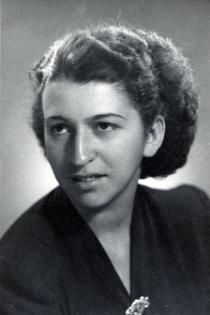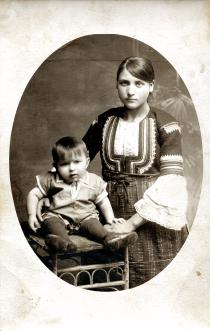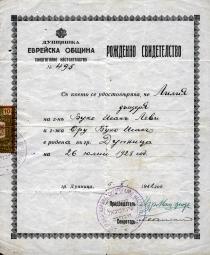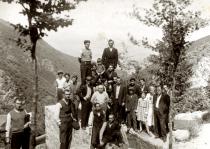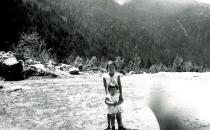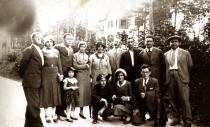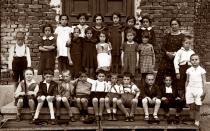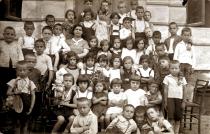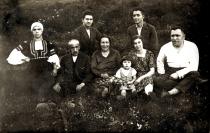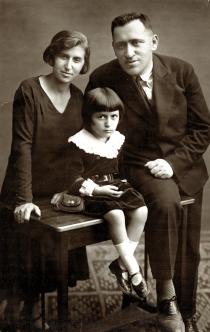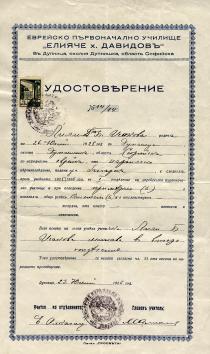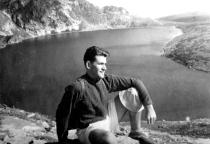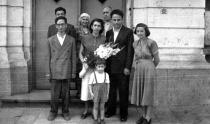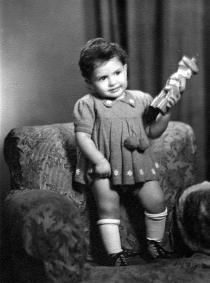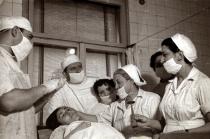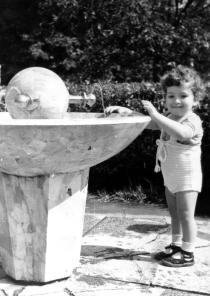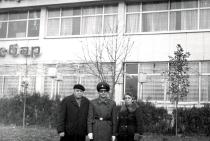This is a picture of my whole family - my mother and father, my grandmother and grandfather and my two uncles, and the maid as well. She is dressed in Bulgarian traditional dress. I'm the little girl. We are here on an excursion out of the town, in the village of Bistritsa, in the beginning of the 30s.
My father's parents were both from Dupnitza. I was born there too. My paternal grandparents used to live together with us and I spent my childhood with them. My grandfather died in 1942 and my grandmother survived the war. I learned much about our Jewish traditions from them.
My grandfather was a deeply religious man and he used to observe all our traditions.
[He] attended the synagogue regularly at all the religious services. We used to celebrate all our holidays. The last time he even got ill out of bed to read the prayer at the table on Pessah [Jewish Easter]. My grandfather had his own set of religious books at home and my father also had his own set. They both had a tallith [prayer shawl] that they used to put on at religious services.
[My paternal grandfather] was compassionate, but not sociable, in contrast with my grandmother who was a very sociable person. She used to contact many people. She was in touch with her sisters all the time.
My grandfather didn't like to go out very much. He was a reserved person and he could hardly stand us - a bunch of children, bothering him with the noise that we used to make.
[He] owned a small-ware shop for vegetables and other goods. He has served as a soldier. He took part in the Balkan War.
My grandmother was a housewife. She used to assist him [grandpa] in his work. Grandpa was selling foodstuffs in his shop, and fruit and vegetables as well. He was a retailer. He always stuck firmly to the quality of the goods. The shop wasn't big, but they had constant clients. The shop was closed on Saturdays and Sundays. Saturday was a market day in our town. People from the nearby villages were bringing fruit with their horses or asses on that day. My parents usually went there to buy some fruit, although it is not accepted [according to Jewish religion] to work on Saturday. My grandfather didn't go, because he was very strict as far as it concerned religious issues, but my grandmother did. After all, there had to be fruit for selling during the week. In wintertime they worked hard to preserve the fruit, they put them into hay when it was extremely cold. There was a small room in the other house (there were two houses in our yard). They used to [put the fruit there and] light large braziers with charcoal it that room in order to prevent fruit from freezing. They had to work really hard to survive.
My father was a physician. My father loved to read. He was always with a book in his hands. Even at the end of his life when he couldn't walk any more he was constantly reading and was aware of all the novelties concerning his job.
My mother was a housewife, so it was mainly her that was doing the cooking [at home], but my grandmother also took part for some dishes - she was very good in preparing pastry. [Mum] was an extremely dedicated person. And she was very skillful - knitting, needlework, fancywork, everything. She was very good in fillet work. She also loved to read very much. And she was a very sociable person. After the War [World War II] she started with social activities. Mum wasn't a vain woman. She demonstrated a refined taste in her clothing. Before the War [World War II] women didn't walk around without hats, and her hat was always chosen according to the season and to the case. My parents liked music very much, so I was a little child when they started to take me to concerts and operas.
My uncles started work immediately after finishing school. They were both working at [my grandfather's] shop, one of them constantly. The other went to a tailor to study the trade, but was assisting with the work at the shop in his free time.
I have one brother who is younger than me. He was a lively child. He was playing with all the other kids in the neighborhood. But he was a very good student. He finished high school and then became a medicine graduate. He went to work in some village as a physician and then started work in our town [Dupnitsa]. My brother is a very sociable person. It doesn't take him a long time to establish contacts with people. He is retired now. He lives in Dupnitsa.
There were some girls coming from the nearby villages to take care of us when we were children. My parents had to hire these girls, because our house was really big. My father had a consulting office in the house, my grandfather's shop was downstairs and there was a lot of housework as well. These girls used to come and work for food and clothes. Many of them wore their traditional dresses, as you'll see on the pictures. When my brother was born, there was a maid, who was extremely clean and tiny. Her dress was always shining white as the snow. People were turning round to look at her on the street. Later she got married but she stayed close to my parents. Her daughter came to Dupnitza to study years after that and she stayed at my mother's. She kept on visiting them. She was like a member of our family.

